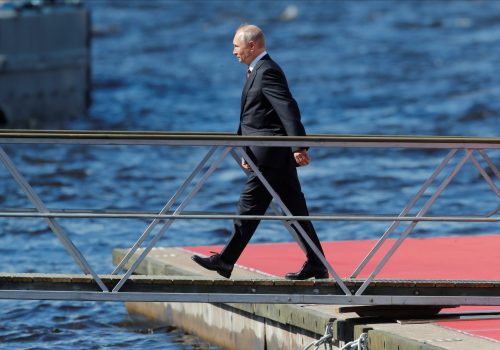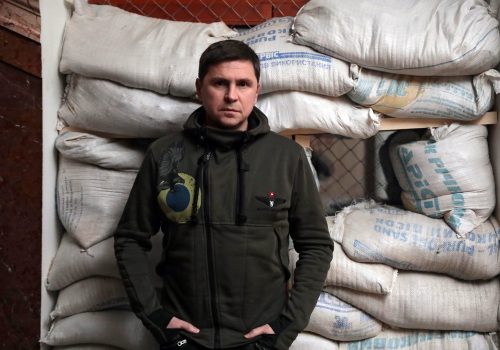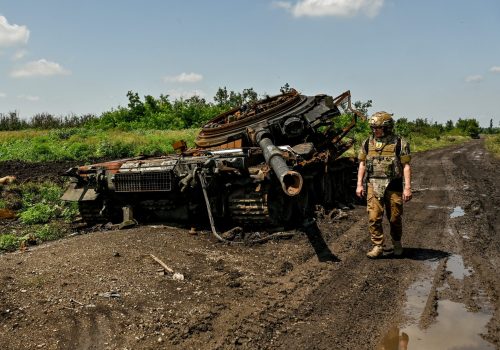How is the business climate in Ukraine doing as Russia’s full-scale invasion approaches the eighteen-month mark? Available data indicates that the private sector is recovering and innovating, with a non-governmental consensus forecast of around 5% GDP growth this year (albeit from a much lower conflict-affected 2022 base). This is also the sentiment you feel whenever Ukrainian entrepreneurs gather.
Whether it’s keynote speakers, panel participants, or coffee break companions, Ukrainian business people are sharing stories of how they shed not only old facilities that ended up occupied or destroyed, but also old habits and suddenly outdated mental frameworks. Ukrainian-owned companies that had been content to stay within the confines of Ukraine or their home region found themselves scrambling to relocate westward (either within Ukraine or beyond), and having to both Europeanize and globalize their sales and support networks. Whether it was a Kyiv-based security systems manufacturer setting up an additional production base in Turkey, or a logistics market leader following its displaced customer base into Central and Eastern Europe, setting up to succeed abroad forced a hard look at home base operations and adaptation to a wider world.
Meanwhile, more than 90% of multinationals working in Ukraine have opted to stay on, while facilitating international mobility for their staff. Many employees were integrated into European networks during the early months of conflict displacement, before returning to Ukraine as conditions in much of the country stabilized. At this corporate level, and in the much bigger ebb and flow of millions seeking refuge and security, we have seen the world’s largest crash course of EU 101 for Ukrainians, and mass familiarization with Ukrainians and their capabilities on the part of Europeans. Years of Euro-integration and “Stronger Together” rhetoric suddenly became very real.
Stay updated
As the world watches the Russian invasion of Ukraine unfold, UkraineAlert delivers the best Atlantic Council expert insight and analysis on Ukraine twice a week directly to your inbox.
The Ukrainian government has also reacted by prioritizing the war and rooting out security threats, including residual Russian leverage in the business sector. However, after a few months of deregulation and tax breaks to help business withstand the initial shock of war, a return to regular policies was initiated in late summer 2022. Driven by expectations on the part of the IMF and other international financial institutions that Ukraine should shoulder its fair share of the financial burden, and by the need to fund the direct military expenditures that partners would not cover, this summoned up some of the old familiar demons that have bedeviled Ukraine’s business climate for decades. These included unpredictable and selective tax and customs administration enforcement, ill-founded criminal prosecutions sweeping up what are really civil or commercial law disputes, and a reductively literal application of the law to punish senior officials who showed business-friendly initiative.
This back-tracking is at odds with the Ukrainian authorities’ proclaimed economic policy goals and does not help to make the country fit for national renewal. Spare capacity in agencies that should no longer be handling economic issues generates spurious cases that do not go to trial but waste thousands of hours of management time spent responding to document subpoenas and attending interrogations. The new Bureau for Economic Security, designed to be a center of expertise on business-relevant enforcement, remains underfunded and adrift, with its acting management on holiday or sick leave. Poor administrative modeling leads to tax clampdowns that hurt legitimate business more than fraudsters. Senior officials who implemented legislatively approved public-private partnerships or corporate governance models are on trial for ostensibly harming the state by “exceeding their competencies,” sending a distinctly chilling message to would-be reformers already in office or thinking of joining the government.
Eurasia Center events

Business leaders shared these and related concerns with Ukrainian President Volodymyr Zelenskyy at a meeting on June 29. An ad hoc committee bringing senior presidential advisors on both the business and law enforcement sides of things has been meeting weekly to get a handle on why reforms in these fields so far have not meshed. As Ukraine’s Business Ombudsman, I’ve offered the support of our experienced legal team in working out the contradictions and disconnects.
Tackling problems together is all the more important as Ukraine’s European Union integration agenda is about to get very real. A €50 billion Ukraine Support Package is to be accompanied by a rigorous pre-accession plan linking quarterly payments to reform results achieved. Gone are the days when hundreds, indeed thousands, of pages of airy strategies could be generated, safe in the knowledge that they would never face the test of contact with reality. Every Ukrainian ministry and every agency will need to not only align formal documents with EU rules, but start acting in ways that make them fully interoperable with counterparts from the 27 current EU member states.
To achieve individual, business, and national goals of renewal, Ukrainians need their government to be just as nimble and adaptive as the country’s private sector. Getting there means not only enabling the new, but also letting go of the old by building down the country’s excess capacity to stop change and change-makers in their tracks. Beyond the existential security challenges created by Russia’s ongoing invasion, this will be the principal task for Ukraine’s business environment in the months and years ahead. Finding the right solutions will prove decisive for the emergence of a new Ukraine as a competitive EU member state.
Roman Waschuk is Ukraine’s Business Ombudsman.
Further reading
The views expressed in UkraineAlert are solely those of the authors and do not necessarily reflect the views of the Atlantic Council, its staff, or its supporters.

The Eurasia Center’s mission is to enhance transatlantic cooperation in promoting stability, democratic values and prosperity in Eurasia, from Eastern Europe and Turkey in the West to the Caucasus, Russia and Central Asia in the East.
Follow us on social media
and support our work
Image: Kyiv, Ukraine. August 6, 2023. (Photo by Maxym Marusenko/NurPhoto)




